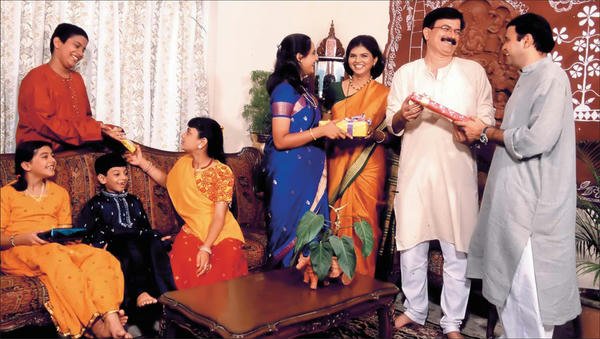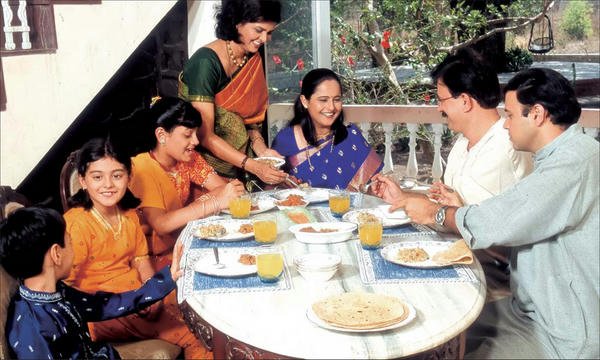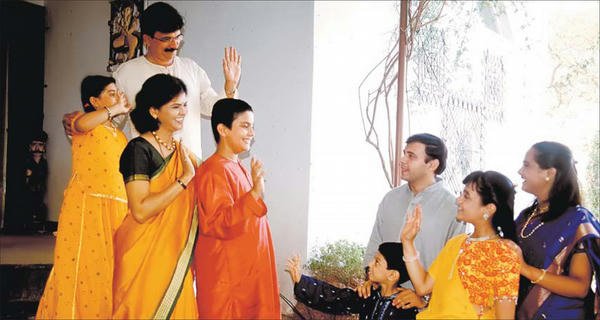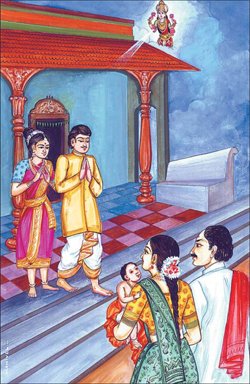
 o you think you are the perfect Hindu host? Well, here’s a story that will make you reevaluate your hospitality skills, for the host in this tale is none other than Lord Krishna. When his boyhood friend, Sudama—hungry, impoverished and in rags—arrived at the palace, the guards refused to allow him in. But Lord Krishna, overjoyed to see his old friend, received him with open arms and joyfully led him to his throne. He personally washed Sudama’s feet and fed him with his own hands. Sudama had brought a humble gift, a handful of parched rice tied in the corner of his shawl and was too ashamed to give it to Lord Krishna in front of all the fine courtiers, but Lord Krishna opened it with delight and ate the grains with pleasure and appreciation. To him, the true value of this meager gift lay in the affection with which it had been offered. Similar stories abound in our scriptures and histories. §
o you think you are the perfect Hindu host? Well, here’s a story that will make you reevaluate your hospitality skills, for the host in this tale is none other than Lord Krishna. When his boyhood friend, Sudama—hungry, impoverished and in rags—arrived at the palace, the guards refused to allow him in. But Lord Krishna, overjoyed to see his old friend, received him with open arms and joyfully led him to his throne. He personally washed Sudama’s feet and fed him with his own hands. Sudama had brought a humble gift, a handful of parched rice tied in the corner of his shawl and was too ashamed to give it to Lord Krishna in front of all the fine courtiers, but Lord Krishna opened it with delight and ate the grains with pleasure and appreciation. To him, the true value of this meager gift lay in the affection with which it had been offered. Similar stories abound in our scriptures and histories. §
Although I did not grow up in a particularly religious household, the concept of hospitality was still very traditionally Hindu, both in giving and receiving. I remember we stopped at a friend’s home in Mathura after a pilgrimage to Haridwar. The hosts received us like VIPs, with open hearts and minds. We ate a wonderful vegetarian meal in the cool evening air in their garden, and then, as the stars came out, the string beds were brought out into the open, for family and guests, each covered with a mosquito net to ward off insects. §
Another time, I was with my older brother, who had to stop at an acquaintance’s home in Old Delhi to pick up some paperwork. The family knew we were coming and had prepared a feast. In this very Hindu home, we removed our shoes, washed our hands and feet and sat on the immaculate kitchen floor with the hosts while a brahmin cook served us one of the most memorable meals I have ever eaten. §
Indeed, you can never leave an Indian household without gaining a few ounces, for you will certainly be plied with some snacks, some tea at the very least, or a glass of cold rose sherbet in the heat of summer. In our home in New Delhi, family and friends came to us from everywhere, and they certainly got more than a glass of water: delicious meals, a comfortable bed, domestics hanging over their every need and, yes, even a guided tour of Delhi, and, sometimes, even Agra. Nor was the hospitality reserved just for visiting guests. Daily food was never eaten without my mother’s consecrating a small portion to God, and a portion being given to a passing needy person or a cow. §
Relatives came and were joyously received, especially on days of shraddha when the priest, uncles, aunts and cousins would descend on the house to honor the memory of ancestors. The house would take on an almost festive air, as scores of children erupted out of the arriving cars. After prayers and feeding the priest, the aroma of sizzling puris and pakodas wafted from the kitchen while elders embarked on a massive talkathon.§
Sundari Katir of California told Hinduism Today, “When I was growing up in Sri Lanka, guests would always be visiting us from different parts of the country and India. The whole household would jump into action. My mother would assemble the meal, and we children would get our rooms all ready, because we would give them up and sleep on mats on the floor. It was such a natural thing to do, and we were always delighted to have guests. Today my brother Ranjan is one of the few relatives left in Colombo, and he carries on the tradition. He treats everyone as God, with good food, comfortable beds and heartfelt hospitality. I have become a better hostess after observing him.”§
God as Guest: The most common Hindu form of worship, puja, is, in fact, an act of hosting. Rare is the Hindu home without a shrine for the Deities. From huge family temples of marble in the homes of the wealthy to modest shrines, Hindus revere their Gods. Daily, images of the family Gods are bathed, clothed and offered fruit, flowers and incense, accompanied by chanting and the tinkle of the bell, all in the format of hosting a guest. The full 16-step puja begins with an invitation for God to come to the home, continues through offering of a seat, washing the feet with water, offerings of drink and food, garments and incense, flowers, etc., until finally the God is thanked and bid adieu. While the standard human guest would receive less adulation, a holy man visiting a family’s home may well be welcomed and worshiped in this complete manner.§
Festivals bring a more intense program to host God. At Dipavali, the Festival of Lights, when Goddess Lakshmi visits the homes of devotees, there is a frenzy of cleaning, sweeping and painting as homes are beautified and decorated with hundreds of earthen lamps to greet Her.§
Guest as God: At the very heart of Hinduism is the belief that the Almighty permeates everything. Indeed, the Hindu belief in the presence of the Paramatma in every living thing transforms each one of us into God. The ancient Hindu texts say the guest has to be shown honor by the host’s going out to meet him, offering him water to wash his feet, by giving him a seat, lighting a lamp before him, providing food and lodging and accompanying him some distance when he departs. Thousands of years have passed, but this code of etiquette remains little changed from the ancient scriptures. §
In the Manu Dharma Shastras, for example, the host is directed thus: “All the food shall be very hot, and the guests shall eat in silence. Having addressed them with the question: ‘Have you dined well?’ let him give them water to sip, and bid farewell to them with the words: ‘Now rest.’” K.T. Achaya in Indian Food: A Historical Companion points out that guests had an honored rank in Vedic society and, after being ceremoniously received, were offered the ambrosial beverage, madhuparka, consisting of ghee, curd, milk, honey and sugar.§
According to the Dharma Shastras, hosting guests is one of the five obligatory sacrifices or duties of the householder. Anusasana states, “The host should give his eye, mind and agreeable speech to the guest, he should personally attend on him and should accompany him when he (the guest) departs; this sacrifice (yajna) demands these five fees.”§
The visit of a holy person is given extra special attention, and for good reason. Vriddha Harita Dharma Shastra says that if a bramachari ascetic stays as a guest in a householder’s home for a single night, the latter’s accumulated sins are destroyed, and when such an ascetic takes food at a man’s house, it is Vishnu Himself who is fed.§
Common Sense: It should be clearly stated that Hindu hospitality does not extend to being careless with the safety of one’s family and home. Even Krishna’s guards kept Sudama—a brahmin at that—outside the gates. When Hinduism Today’s founder, Satguru Sivaya Subramuniyaswami (Gurudeva), was in Sri Lanka as a young man, he experienced wonderful hospitality across the island from all the communities. Part of the time he stayed in the traditional Tamil village of Alaveddy at the home of Kandiah Chettiar, one of his teachers, receiving instructions on, among other things, the hosting of guests. One day, Chettiar had given food to a suspicious-looking man at the gate, rather than inviting him to the porch of the house. When the young Gurudeva asked why he didn’t invite the man in, Chettiar replied, with characteristic frankness, “Because he would steal everything in the house.” The Dharma Shastras discuss at some length the issue of unworthy or even dangerous guests, yet advising that, no matter what the circumstances, the visitor should at least receive food. §
Village Traditions: Sheela Venkatakrishnan of Chennai, Tamil Nadu, told HINDUISM TODAY, “You offer your guest the same love and respect that you would offer to God. Simple! A striking example of hospitality is when the whole town of Kumbakonam, where my father hails from, turns host during the week of the Mahamaham.” Thousands upon thousands of people come for the holy bath in the tank of the Kumbareswaran temple, and every home opens its doors to accommodate and feed all who reach its doorstep. No one is turned away.§
Tips for Being a Good Guest
 GUEST MAY BE ANYONE FROM a close relative to a total stranger, and rules naturally vary accordingly. What is summarized here is for a visitor somewhere between the two extremes.§
GUEST MAY BE ANYONE FROM a close relative to a total stranger, and rules naturally vary accordingly. What is summarized here is for a visitor somewhere between the two extremes.§
Arrival: It is traditional that a guest need not inform a host of his impending arrival. However, in today’s busy world, more and more often guests do give advance notice. The host may insist that no advance notice is necessary, and close friends or relatives may even take advance notice as an affront, a disturbing sign that all may not be well with the relationship.§
Duration: It is very impolite of the host to ask how long the guest is staying. But, as a guest, you should convey this information in an casual manner. In a gesture of hospitality, the host will naturally retort that you should really stay much longer. §
Gifts: Gifts are always given to hosts by guests when staying overnight in a home. The value of the gift varies greatly, of course, depending on the guest’s circumstances and resources. It is proper to give a separate gift for the wife and the husband. The wife receives the nicest item. Small items should also be given for the children. In Sri Lanka, giving goes the other way as well. It is common for the host to give a gift to the guest, especially those poorer.§

Surprise: Guests may even arrive unannounced§
Helping: In a home without servants, considerate guests can help with housework and chores, as well as care for their quarters, even if the host insists it is not necessary. You can also help with cooking, as well as invite your hosts out for a meal.§
Graciousness: It is an insult to refuse any offered drink or food. Blend into the family’s rhythms. Be a genuine friend, taking real interest in the family’s life and treating the children lovingly, as you would your own. Conversely, one should not meddle in family affairs, nor later make unflattering observations to others about one’s hosts. §
Thanks: After returning home, remember to send a warm and sincere thank-you letter, hand-written, mentioning some specific detail of your visit that you most appreciated.§
Honing the Art of Hosting
 OSTING IS MORE AN ATTITUDE than a set of practices. The perfect host is truly open to guests and honestly delighted with their presence. That said, here are some specifics to keep your hosting up to par.§
OSTING IS MORE AN ATTITUDE than a set of practices. The perfect host is truly open to guests and honestly delighted with their presence. That said, here are some specifics to keep your hosting up to par.§
Welcome: Greet the guest with namaskara, invite him cheerfully into the house. Invite him to sit comfortably in the best surroundings. Speak pleasantly to him, inquiring about his welfare.§
Refreshments: Always offer the guest something to eat and drink. Usually tea or juice is served, along with snacks. At least a glass of water is offered (with a smile and apology).§
Hosting: Guests who are members of the extended family will just fit in to the family routine. When a bit more formality is called for, the father, if present, will speak with the guest. If not present, the mother and a son will fulfill this role, and if no son is present, the mother may act as hostess, but only with the accompaniment of someone close to the family. The children may go off to play among themselves, stay with the adults or come and go. §

Welcome! A pleasant reception is the first step§
Wife Home Alone: If the lady of the house is home alone and a male visitor comes to see her husband, it is not proper for her to invite him in, or for him to expect to enter. Rather, he will leave a message and depart.§
Punctuality: Life is generally more relaxed in the East than in the West. A good guideline is to not be surprised or offended if your guest arrives late or early. However, be punctual in your own engagements, as this is appreciated.§
Duration of Stay: It is quite impolite to ask a guest how long he intends to stay, but it is good protocol for guests to make their plans and itinerary known from the outset.§
Goodbyes: Always see your guest to his transport, and wave and watch until they are out of sight. §

An enjoyable visit results when both guest and host are experts in the art of congenial conversation.§
Sheela explained, “Houses in the villages and towns of Tamil Nadu usually have a fairly large platform just outside their front door, called a thinnai. This serves two purposes. One is temporary storage of grain during the harvest and also an airy place to sleep during the hot and humid summers. It is not unusual for a traveller to use this as a resting place. You could open your front door in the morning and find someone sleeping on your thinnai. This is where you would find the strangers during Mahamaham. Of course, family and friends would be accommodated inside the house. But everyone is fed, irrespective of caste. It is possible that in the morning there is one set of people, in the afternoon another and a totally different group at night. The meals served would be according to whatever time of day it is. Also, the bath area often has a separate access from outside the house.”§
In her grandfather’s day, Sheela noted, it was the practice for the head of the household to stand at his doorstep at mealtime and ask loudly, not once but thrice, “Is there someone who needs to be fed?” Sometimes a traveler or a poor man would come in for food. It was only after the guest had been fed that family would eat—one of the explicit instructions in the Dharma Shastras. The Apastamba says, “He who eats before his guest eats destroys food, prosperity, progeny, cattle and the merit of his own house.” §
Hospitality permeates Indian culture, both on a personal and institutional level. In Tamil Nadu, many of the bigger and older temples have the annadanam scheme—a daily free feeding. Recently, with the active patronage of the government, many more temples have revived this practice, where they feed a minimum of 100 people each day at noon. Muslim darghas have adopted this practice, while the Sikh gurudwaras have always followed it. Mention also has to be made of the Hyderabadi brand of hospitality that has few parallels. Made famous by the Muslim nawabs of Lucknow, those on the receiving end enjoyed courtesy, food, drink and congeniality—all served with an elegant world-class flourish. Every ethnic and religious subculture of India puts a premium on hospitality.§
Little wonder, then, that in multicultural India these varied streams of hospitality have coalesced to produce a generous and warm people. Visitors to India come away with awed stories of the way they were embraced and included in every family celebration—in fact, made part of a larger, extended family. Often these relationships last over the years.§
You cannot go to even the humblest home without being honored with food and Indian drink, as Janet Chawla found out some years back. Chawla, an American who married a Sikh and now lives in New Delhi, believes the charm of India is in the graciousness of its people, although it is getting less so in the big cities. She feels there is a grace, a way of sitting together, singing together at weddings. People in small villages, she says, really are very giving, sharing the little they have.§
“In America, if we were sitting and working together, and I had a sandwich—I would open it and eat it alone. An Indian would never do that,” she says. “There is this kind of culturally prescribed sharing which I find very gracious.” Janet didn’t mention it, but some Westerners visiting India can find the level of hospitality discomfiting, especially the tradition of never leaving a guest alone. That impinges upon the Westerner’s desire for privacy and “personal space”—concepts absent from the Indian milieu.§
Hospitality at Home: Hindu tradition lays great stress on the respect due to guests. The greatest hurt for a guest is the thought that the host or hostess does not enjoy one’s presence. Therefore, Hindus go out of their way to make each guest feel welcome. It is proper protocol to drop whatever one is doing, no matter how important, to entertain a visitor. One of the privileges of friendship in the East is being able to drop by any time without advance notice. §
Mitesh Patel, whose family hails from Kathiawad region of Gujarat, says that in his hometown hospitality is extended to everyone: “When a guest comes to our house, we rarely let them go without offering a good meal. We don’t feel that guests are a burden, whether they are staying for few hours or few days, and offer them full assistance.” §
He gives the example of his uncle who left the ancestral village 30 years ago to settle in the city of Rajkot. Three decades later, if anyone from the village comes for a medical checkup to the big hospital in the city, his uncle makes sure healthy, home-made meals go out to the patient every single day.§
The level of hospitality depends upon several factors, the most obvious being family ties. Traditionally, any known or unknown member of one’s extended family—and the Hindu extended family includes not only blood relatives to several degrees removed, but also all the in-laws by marriage—is basically treated just like a member of the immediate family. It would not be uncommon, for example, for a student at the university to stay with distant relatives throughout his entire schooling. §
Then there are friends, business acquaintances, people from the same village or state and so on, all of whom have some connection to the host. They, too, may be treated just like a member of the extended family, as Janet Chawla experienced, though commonly a bit more formally. We can see from Sheela’s description of her childhood village that the homes were designed to accommodate even total strangers in a convenient fashion.§
The concept of hospitality extends to welcoming customers to business settings, where it certainly makes good sense. Go into a sari shop in crowded marketplaces and the owner will automatically offer you a soft drink in the heat. If you’re shopping for an expensive wedding trousseau, they are even more solicitous—offering coconut water, a snack and drinks from the market. I recall my father in his jewelry store not only offering soft drinks, paan in silver containers and candy, but also giving the kids who came to the shop small items as gifts. §
Untouchables: Yet, one does have to admit that Hinduism’s glowing hospitality report card does have one very big black mark on it, something which the Gods probably did not ordain but which wily man has reinterpreted for his own gain—the treatment of the so-called lower castes. It is really quite inconceivable that a loving religion, which proclaims that God is in every living thing, would denigrate a whole class of human beings as untouchables. §
The story of everyday village India is full of the low castes being turned away from village wells, being castigated for worshipping at the temple or merely for passing by the home of a brahmin. While things are improving in the big cities where caste and creed lose their importance in the great economic bazaar and where politicians see the lower castes as potential votes, the village scene remains woefully medieval. Buried in the back pages of newspapers are frequent stories of atrocities, which should shock us all from our complacency and our conceit of just how “hospitable” we may really be.§
Loss of Tradition: In the larger hospitality picture, things seem to be changing for the worse as the time-honored extended family finally battles modernity. Dr. T. H. Chowdary of Hyderabad writes, “As people leave their villages and joint families break up and the educated move to flats in the cities, the old idea of hospitality is fast dying. In the villages and small towns in the past, in the evening when beggars came for food, whatever was left in the house would be given away. In those days of no refrigeration, food could not be kept. Now in the towns and cities, surplus is stored in refrigerators, which have thus come to be known as garibmar, the killers of the poor. §
Serving food is a host’s duty. To omit this courtesy is a serious affront, as it is for the guest to refuse what is offered.§

“Even when brothers and sisters and such near ones come, one silently wishes that they will stay in a hotel and, at best, they might come for a dinner or a breakfast,” he goes on. “What to speak of caring for the parents or relatives when the wife and husband have no time even to talk to one another! Or when the one-year-old child, the only child, is put in a day-care center so that both the wife and husband can earn enough to satisfy their ideas of modern comforts, including that refrigerator or new TV§

A fond farewell puts a sweet end to the guests’ experience, and creates anticipation for the next visit§
“What to speak of hospitality for friends and unknowns,” says Chowdary, “when the nuclear family of wife and husband are saying that the old father must stay with one son and the old mother with another son? They want to separate the old parents, considering them burdens to be shared by the sons.”§
As Chowdary observes, with women joining the work force in large numbers, and time, effort and budgets stretched by modern life, the old-time hospitality is often compromised. Earlier, visitors could just drop in, but now hosts get agitated to find unexpected guests on the doorstep—a far cry from the hospitality of the village home’s thinnai.§
Sheela Venkatakrishnan agrees: “In recent years, the trend has become, as Gurudeva said, ‘The women going out of their homes to work.’ Living in nuclear families, who is there to take care of the home, leave alone a guest? You tend to think twice about visiting a friend or relative, not wanting to impose or inconvenience them in any way.” Still, she points out that they have many relatives in joint families who welcome them with open arms. She herself lives in a joint family in Chennai where someone is always home: “The doors of our home and our hearts are open to God and all whom He chooses to send our way.”§
The Diaspora Adjusts: The picture, however, is bleaker in the diaspora, where immigrants struggle with the beliefs they grew up with and the pressures of their new environment. Most manage to keep the hospitality intact for family and close friends. Some go to extraordinary lengths, sponsoring relatives and even opening up their homes to them till they get settled. §
The Gujarati community is particularly strong in this respect, and many continue to live in large, extended families abroad. This sense of caring is extended to the entire community and, in fact, many Patels have managed to do so well in the motel business because of their unity and financial support of friends and relatives. No wonder the Gujaratis command a whopping portion of the motel industry. They are well-trained in the ways of hospitality, for as one of the successful hoteliers, H.P. Rama, affirms, “We Indians believe the guest is God.”§
Mitesh Patel, who lives in Edison, New Jersey, came to the US when he was 15, so he has seen life on both continents. Now 24, he believes that Hindu hospitality has lessened in the US, Canada and the UK, but not in India: “I believe the reason is quite simple. NRIs are busy making big bucks in these countries. Sometimes even family members don’t see each other for a few days because they are busy working, so they feel that it’s hard to accommodate a guest.” §
Indeed, living abroad, notions of hospitality do undergo a change. Also, abroad, one would never dream of dropping in on acquaintances without calling ahead. This is a culture where even children do not just play but have organized “play dates” scheduled out weeks in advance.§
Indians living abroad do have to contend with housework, their jobs and the daily commute, all without the support of extended family or domestic helpers. So their standards of hospitality have diminished. Some compromise, putting guests in hotels or taking shortcuts in their care. Truly generous hospitality in any society or home depends on the strength, integrity and security of the family unit.§
Changing Attitudes: Summer, especially, means an endless barrage of guests from India and points in the diaspora. Homes become as crowded as the Grand Central Terminal, and hosts are faced with a multitude of tasks. As one exhausted woman, whose house was full of summer guests, told me, “Houseguests are like fish: after three days, they stink.” §
She didn’t know it, but this adage appeared in the 1736 edition of Poor Richard’s Almanac by Benjamin Franklin, one of America’s founding fathers. He said, precisely, “Fish and houseguests stink after three days.” The statement, and the attitude behind it, stand in stark contrast to the Hindu view of the guest as God. And it’s not just an American trait. Shakespeare wrote with a similar attitude in King Henry VI, Part I, “Unbidden guests are often welcomest when they are gone.” In all fairness, there are many hospitable Americans and Britishers, but offering hospitality is not the religious obligation it is for Hindus. It is also relevant that, in the Hindu village, true strangers were served on the porch, or even at the compound gate, in order to preserve the sanctity and safety of the home.§
While the pressures of life in the West are there for the hosts, to some extent their attitudes have also changed. The rhythms of the place where you live impact you. Leading frenetic lives in the West, people tend to become more brusque, more cynical. Like Franklin, they begin to regard the guest as an unwelcome nuisance. Standards of hospitality are indeed changing, and one wonders how far we should embrace modernization at the expense of true hospitality?§
What to Do? Gurudeva once observed, “The guest is God, not an intruder. All Hindus have a heart to receive the guest as God. This is very important for us to remember, because guests come and guests go. Often, guests come and never come back, because of subtle inflections in the voice, because it was forgotten to serve even a glass of water, which is traditional in Hindu culture. The guest is God, not an intruder. When someone steps up to you, drop your work. People are more important than paper. People are more important than giving oneself to the computer. People are more important than anything else. People are the working out of your karma.”§
Yes, it may help to remember an old Indian saying: Dane dane pe likha hai khane wale ka naam—“On each grain is written the name of the eater.” The people who turn up on your doorstep are meant to be there, part of your karma, part of the big cosmic play. Of course, it’s hard to see it quite that way when you are under stress at work and still have to produce dinner for your guests by 7:00 pm!§
For Hindus caught in the modern world of hurry and scurry, it would be good to reaffirm their duty toward guests and to refresh their memories on how to be perfect hosts—and perfect guests. There is etiquette for both roles, and if each plays his part well, the whole experience can be rewarding. §
Hosts should give of themselves with a generous and open heart, exerting every effort to make their visitors’ stay a memorable one, where the kindnesses and warmth are vast, even if the budget is tight. They should do all they can to entertain and help visitors in a new and bewildering place.§
Guests should attempt to be considerate, informing their hosts of their length of stay in advance. They should pick up after themselves and not add to the harried hostess’ tasks. Bringing small gifts for the family members, entertaining the children or perhaps offering to take the family out to dinner are practical and appreciated gestures. §
Hospitality is a virtue that has many benefits for the receiver and the giver, as these small kindnesses smooth social connections and build relations. It also shows the next generation the way to continue the beliefs of our ancestors. And of course, often the shoe is on the other foot—and the host himself becomes a guest. So he should treat his guests as he himself would like to be treated.§
There are so many stories of God Vishnu himself donning beggar’s raiment and coming to the door for alms. So, the next time the doorbell rings, welcome your guests with an open heart. Look beyond the facial features, the clothing and the physical bodies into the eternal soul which glows within each of us like the purest of gold. This is the Self that scripture says is immortal, the one that water cannot wet, sword cannot cut nor fire burn. And so, bending low, with folded hands, welcome the divine Paramatma, the God who is within each of us. §
The author, Lavina Melwani, a popular free-lance correspondent, was born in Sindh, grew up in New Delhi and has lived in Hong Kong and Africa. She currently resides in New York with her husband and two children. T. H. Chowdary, Information Technology Advisor: Government of Andhra Pradesh, contributed to this article. §
The Holy Kural on Hospitality
 HE SOUTH INDIAN ETHICAL MASTERPIECE, Tirukural, composed in Tamil couplets by Saint Tiruvalluvar (ca 200 bce), devotes an entire chapter to hospitality. This sagely compendium of practical advice, called “a bible on virtue for the human race,” is so pithy, so profound and so sacred that it is sworn upon today in South Indian courts. Here now are verses 81 to 90.§
HE SOUTH INDIAN ETHICAL MASTERPIECE, Tirukural, composed in Tamil couplets by Saint Tiruvalluvar (ca 200 bce), devotes an entire chapter to hospitality. This sagely compendium of practical advice, called “a bible on virtue for the human race,” is so pithy, so profound and so sacred that it is sworn upon today in South Indian courts. Here now are verses 81 to 90.§
The whole purpose of earning wealth and maintaining a home is to provide hospitality to guests.§
When a guest is in the home, it is improper to hoard one’s meal, even if it happens to be the nectar of immortality.§
If a man cares daily for those who come to him, his life will never suffer the grievous ruin of poverty. §
Wealth’s Goddess dwells in the hospitable home of those who host guests with a smiling face.§
If a man eats only after attending to guests’ needs, what further sowing will his fertile fields require?§
The host who, caring for guests, watches hopefully for more, will himself be a welcomed guest of those whose home is Heaven.§
Charity’s merit cannot be measured by gifts given. It is measured by measuring the receiver’s merits.§
Those who never sacrifice to care for guests will later lament: “We hoarded wealth, estranged ourselves, now none will care for us.”§
The poverty of poverties is having plenty yet shunning guests. Such senselessness is only found in senseless fools.§
The delicate anicham flower withers when merely smelled, but an unwelcome look is enough to wither a guest’s heart.§
